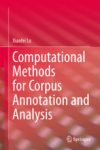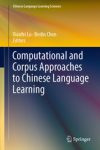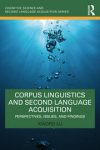Xiaofei Lu

Education
Websites
Professional Bio
Dr. Xiaofei Lu’s research interests are primarily in corpus linguistics, English for Academic Purposes, second language writing, second language acquisition, and computer-assisted language learning. He has had a longstanding interest in issues related to lexical and syntactic complexity. He has made available several computational tools to facilitate their automated analysis, including the L2 Syntactic Complexity Analyzer, the Lexical Complexity Analyzer, and the D-Level Analyzer. He has also conducted numerous studies to investigate the relationship of lexical and syntactic complexity to language proficiency, language development, and language production quality as well as the effects of various learner- and task-related factors on this relationship. His current research calls for closer attention to the meaning and function dimensions of linguistic complexity and highlights a framework that integrates corpus- and genre-based approaches to academic writing research, teaching, and assessment, with a particular focus on the linguistic realizations of different rhetorical and communicative functions in different genres of academic writing. Dr. Lu teaches several courses on corpus linguistics (APLNG 578; APLNG 579) and technology-mediated language learning (APLNG 588; APLNG 589). He is the author of Corpus linguistics and second language acquisition: Perspectives, issues, and findings (Routledge, 2023) and Computational methods for corpus annotation and analysis (Springer, 2014) and lead co-editor (with Dr. Berlin Chen) of Computational and corpus approaches to Chinese language learning (Springer, 2019).
Select Recent Articles and Book Chapters
Li, Y., Lin, S., Liu, Y., & Lu, X. (2023). The predictive powers of fine-grained syntactic complexity indices for letter writing proficiency and their relationship to pragmatic appropriateness. Assessing Writing, 56, 100707.
Yin, S., Gao, Y., & Lu, X. (2023). Diachronic changes in the syntactic complexity of emerging Chinese international publication writers’ research article introductions: A rhetorical strategic perspective. Journal of English for Academic Purposes, 61, 101205.
Lu, X., & Hu, R. (2022). Sense-aware lexical sophistication indices and their relationship to second language writing quality. Behavior Research Methods, 54(3), 1444-1460.
Lu, X., & Wu, J. (2022). Noun phrase complexity measures in Chinese and their relationship to L2 Chinese writing quality: A comparison with topic-comment-unit-based measures. The Modern Language Journal, 106(1), 267-283.
Hu, R., Wu, J., & Lu, X. (2022) Word-combination-based measures of phraseological diversity, sophistication and complexity and their relationship to L2 Chinese proficiency and writing quality. Language Learning, 72(4), 1128-1169.
Zhang, X., Lu, X., & Li, W. (2022). Beyond differences: Assessing effects of shared linguistic features on L2 writing quality of two genres. Applied Linguistics, 43(1), 168-195.
Lu, X., Yoon, J., & Kisselev, O. (2021). Matching phrase-frames to rhetorical moves in social science research article introductions. English for Specific Purposes, 61, 63-83.
Lu, X., Yoon, J., & Kisselev, O., Casal, J. E., Liu, Y., Deng, J, & Nie, R. (2021). Rhetorical and phraseological features of research article introductions: Variation among five social science disciplines. System, 100, 102543.
Lu, X., Casal, J. E., & Liu, Y. (2020). The rhetorical functions of syntactically complex sentences in social science research article introductions. Journal of English for Academic Purposes, 44, 100832.
Peng, J., Wang, C., & Lu, X. (2020). Effect of the linguistic complexity of the input text on alignment, writing fluency, and writing accuracy in the continuation task. Language Teaching Research, 24(3), 364-381.


